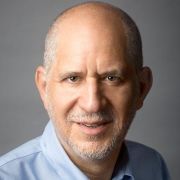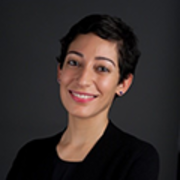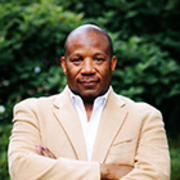Research to Change the World: Translating Ideas, Transforming Practice
Research to Change the World: Translating Ideas, Transforming Practice

Max Bazerman
Corinne Moss-Racusin
Emilio Castilla
Don Tomaskovic-Devey
Shelley Correll
Susan Sturm
Sarah Cliffe
Maria Konnikova
Amy Cuddy
Heidi Brooks
Martin Davidson
Laura Kray
Deborah Rhode
Sandra Sucher
Catherine Tinsley

May Al-Dabbagh
May Al-Dabbagh is an assistant professor at New York University Abu Dhabi and has an associated appointment as a global network professor at New York University. She conducts research on gender and work in the Gulf using a combination of social psychology, public policy, and post-colonial feminist lenses. She has published in Organization Science, Journal of Middle East Women’s Studies, Contexts, and Idafat: Arab Journal of Sociology (in Arabic). Her current book project, The Messy Middle, is an ethnography of serial migration in Dubai focusing on motherhood, work, and movement (under contract with Columbia University Press).
She has received fellowships from the Center of Advanced Study in the Behavioral Sciences (Stanford), The Women and Public Policy Program (Harvard), and The Global Institute for Advanced Study and Tisch School of the Arts (NYU).
She currently directs Haraka: Experimental Lab for Arab Art and Social Thought which bridges the social sciences and arts at the al Mawrid Arab Center for the Study of Art at NYUAD.
Al-Dabbagh holds a BA from Harvard University and a PhD from University of Oxford. For more information on research and artistic collaborations see: www.mayaldabbagh.org
May Al-Dabbagh is an assistant professor at New York University Abu Dhabi and has an associated appointment as a global network professor at New York University. She conducts research on gender and work in the Gulf using a combination of social psychology, public policy, and post-colonial feminist lenses. She has published in Organization Science, Journal of Middle East Women’s Studies, Contexts, and Idafat: Arab Journal of Sociology (in Arabic). Her current book project, The Messy Middle, is an ethnography of serial migration in Dubai focusing on motherhood, work, and movement (under contract with Columbia University Press).
She has received fellowships from the Center of Advanced Study in the Behavioral Sciences (Stanford), The Women and Public Policy Program (Harvard), and The Global Institute for Advanced Study and Tisch School of the Arts (NYU).
She currently directs Haraka: Experimental Lab for Arab Art and Social Thought which bridges the social sciences and arts at the al Mawrid Arab Center for the Study of Art at NYUAD.
Al-Dabbagh holds a BA from Harvard University and a PhD from University of Oxford. For more information on research and artistic collaborations see: www.mayaldabbagh.org
Colleen Ammerman

Jennifer Berdahl
Jennifer Berdahl (PhD, Social Psychology) is a Professor in the Department of Sociology at the University of British Columbia. Her research focuses on the social psychology of gender and power at work, specializing in the relationship between organizational culture and sexual harassment. Berdahl regularly presents her research to professional, media, and academic audiences. She serves as an expert witness in individual and class action discrimination cases in both the U.S. and Canada.
Jennifer Berdahl (PhD, Social Psychology) is a Professor in the Department of Sociology at the University of British Columbia. Her research focuses on the social psychology of gender and power at work, specializing in the relationship between organizational culture and sexual harassment. Berdahl regularly presents her research to professional, media, and academic audiences. She serves as an expert witness in individual and class action discrimination cases in both the U.S. and Canada.
Mikki Hebl
Ellen Kossek

Robert Livingston
Dr. Robert Livingston is a social psychologist whose research has been published in top-tier academic journals such as the Journal of Personality and Social Psychology, Academy of Management Journal, Personality and Social Psychology Bulletin, Psychological Science, Journal of Experimental Social Psychology, and Leadership Quarterly. His work has also appeared in The New York Times, The Wall Street Journal, and Harvard Business Review.
Prior to joining the Harvard Kennedy School in 2015, he was an Assistant Professor at the University of Wisconsin-Madison, Associate Professor at Northwestern University’s Kellogg School of Management, and Professor of Organizational Behaviour at the University of Sussex in England, where he was the chair of the organizational behaviour area as well as the founder and faculty director of Centre for Leadership, Ethics, and Diversity (LEAD).
His research ranges from micro-level investigations of the psychological and physiological processes that underlie unconscious bias—to more macro-level examinations how biases impact organizational diversity, leadership representation, and social justice. For example, his research on the “Teddy Bear Effect” finds that Black CEO’s uniquely benefit from having facial features that make them appear warmer and less threatening (i.e., babyfaceness). He is also known for his research on the intersectionality of race and gender, and how the nature of bias systematically differs for White women, Black women, and Black men.
He is a practitioner as well as a researcher. For decades, he has served as a diversity consultant to scores of Fortune 500 companies, public-sector agencies, and non-profit organizations. He is the author of the book The Conversation: How Seeking and Speaking the Truth about Racism Can Radically Transform Individuals and Organizations recently published by Penguin Random House.
Dr. Robert Livingston is a social psychologist whose research has been published in top-tier academic journals such as the Journal of Personality and Social Psychology, Academy of Management Journal, Personality and Social Psychology Bulletin, Psychological Science, Journal of Experimental Social Psychology, and Leadership Quarterly. His work has also appeared in The New York Times, The Wall Street Journal, and Harvard Business Review.
Prior to joining the Harvard Kennedy School in 2015, he was an Assistant Professor at the University of Wisconsin-Madison, Associate Professor at Northwestern University’s Kellogg School of Management, and Professor of Organizational Behaviour at the University of Sussex in England, where he was the chair of the organizational behaviour area as well as the founder and faculty director of Centre for Leadership, Ethics, and Diversity (LEAD).
His research ranges from micro-level investigations of the psychological and physiological processes that underlie unconscious bias—to more macro-level examinations how biases impact organizational diversity, leadership representation, and social justice. For example, his research on the “Teddy Bear Effect” finds that Black CEO’s uniquely benefit from having facial features that make them appear warmer and less threatening (i.e., babyfaceness). He is also known for his research on the intersectionality of race and gender, and how the nature of bias systematically differs for White women, Black women, and Black men.
He is a practitioner as well as a researcher. For decades, he has served as a diversity consultant to scores of Fortune 500 companies, public-sector agencies, and non-profit organizations. He is the author of the book The Conversation: How Seeking and Speaking the Truth about Racism Can Radically Transform Individuals and Organizations recently published by Penguin Random House.
